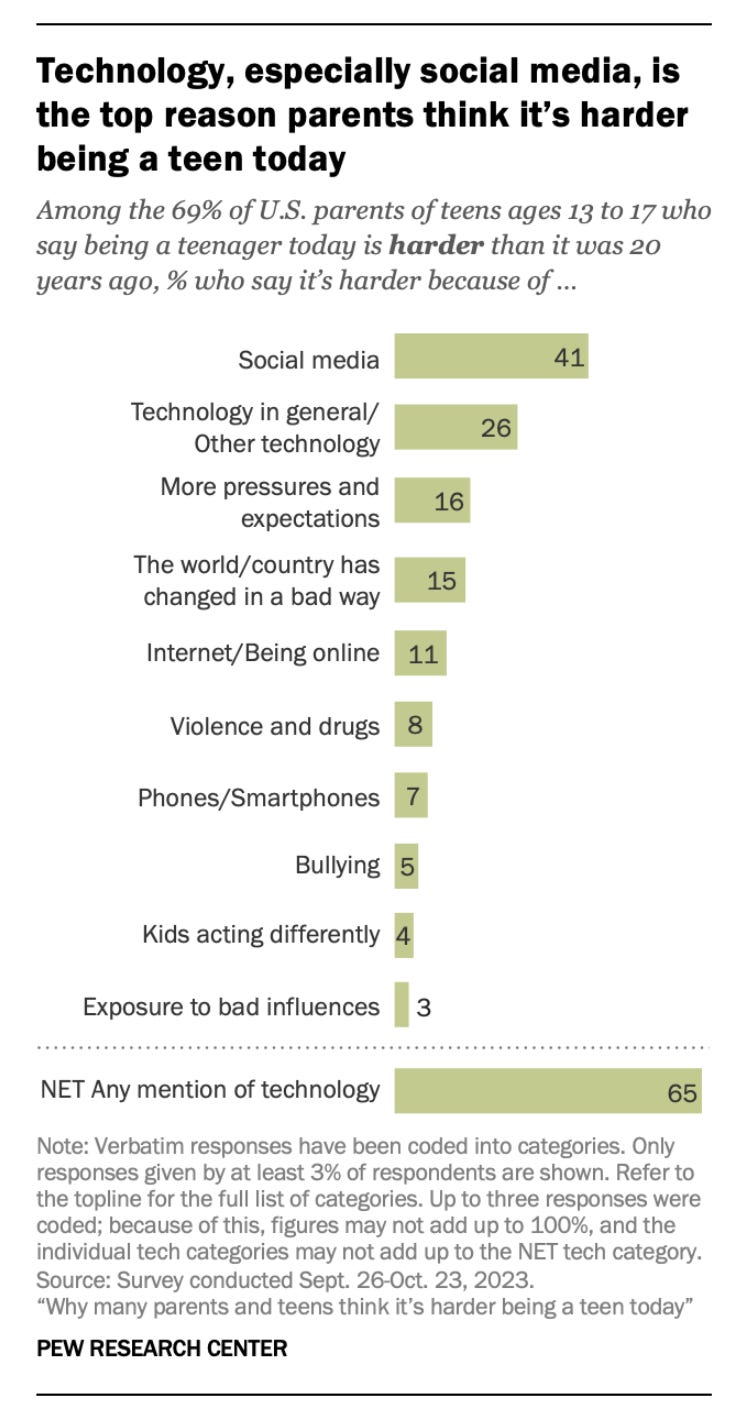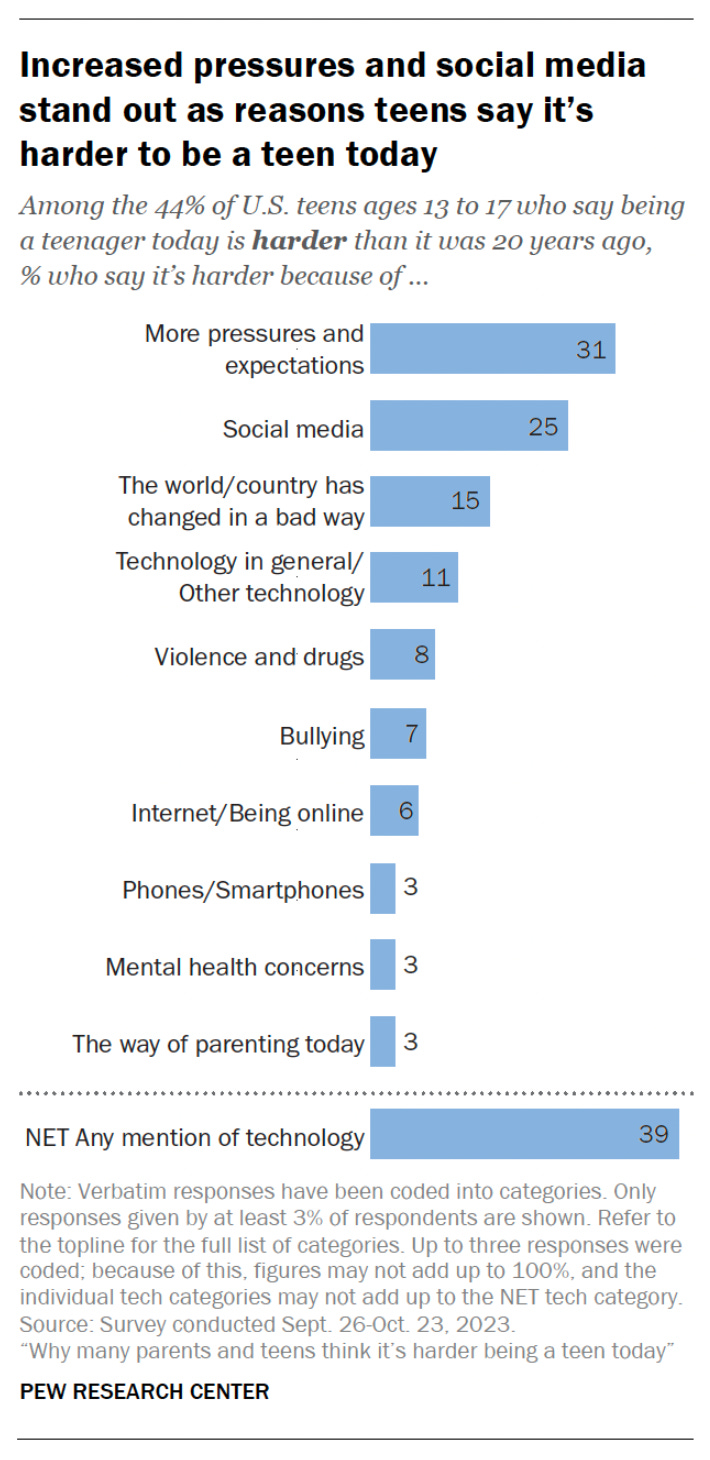The latest from Pew Research about parents, kids and ...
Digital screens, of course. It's an issue that won't go away, even if most churches are silent
About a dozen years ago, I heard a religion-beat colleague say, with a sigh, something like this: “It’s getting really hard not to write about Pew Research polls more than once a month.”
True, that. I was there and, as a columnist, I kept opening emails from the Pew team and thinking, “There they go again.”
This trend was already clear before the 2012 data-earthquake entitled, “‘Nones’ on the Rise,” which opened with two paragraphs that rocked the world of institutional religion:
The number of Americans who do not identify with any religion continues to grow at a rapid pace. One-fifth of the U.S. public — and a third of adults under 30 — are religiously unaffiliated today, the highest percentages ever in Pew Research Center polling.
In the last five years alone, the unaffiliated have increased from just over 15% to just under 20% of all U.S. adults. Their ranks now include more than 13 million self-described atheists and agnostics (nearly 6% of the U.S. public), as well as nearly 33 million people who say they have no particular religious affiliation (14%).3
That headline-generating survey came a few years after the prophet Steve Jobs changed the world with his introduction of the iPhone.
I am not saying that one of these trends caused the other.
I do, however, think they are linked for multiple reasons — starting with screens culture (a) eating kazillions of hours of time and attention in the lives of ordinary people and (b) providing alternative forms of information, authority and community that compete (especially among the young) with parents, pastors, teachers and counselors. You can see some of these trends in my recent conversation with Jonathan (“The Anxious Generation”) Haidt of New York University. The headline on that Substack post (which, to my surprise, many subscribers didn’t read) was: “Digging deeper into spiritual issues in screens culture.”
Now we have a Pew Research study that I predict will not generate as many headlines as the “Nones” report, in part because the world is already full of news about screens-culture wars. Scan this Google News search to see what I mean.
This new Pew report — “Why Many Parents and Teens Think It’s Harder Being a Teen Today” — avoided questions that deliberately raise religious and moral issues. However, I will continue to argue that trends affecting family life, mental health and, literally, the building blocks of daily life are automatically “religious” when viewed through the eyes of people of faith.
Remember those three “discipleship” questions from my early 1990s teaching at Denver Seminary? For context, here is a chunk of the Rational Sheep overture the day that I opened this project:
The Master of Divinity student was confused and angry. Why was it so important, he asked, to analyze news and entertainment trends? Everyone knows that the secular media are liberal and opposed to the church. So why spend so much classroom time talking about popular culture? After all, he said, he came to seminary to learn how to be a pastor. What did this media stuff have to do with that?
"Now, pretend that I don't speak fluent evangelical, I said, in response. "Tell me, in simple English, about a subject that really matters to seminary students.''
In the front row, a student answered: “Discipleship."
That's a code word, I said. What does “discipleship" mean?
The student said that he wanted his ministry to touch the real lives of real people. He wanted to affect their views on the big issues, such as jobs, marriage and money. “I want the faith to affect ... how they really live," he said.
I agreed. “Discipleship," if taken seriously, should have an impact on checkbooks, pocket calendars, parenting and daily life. Then I pivoted and pointed to my list of the major forms of modern mass media — television, advertising, movies, print and video news media, popular music, etc. Of course, these secular media, I joked, don't influence how people view work, success, sex, family, divorce, children, life, death or eternity. And the folks who run the media never ignore or knock Christianity. Right?
Looking around, I could see lights clicking on. At that moment, I improvised a kind of journalistic definition of "discipleship,'' consisting of three questions: How do you spend your time? How do you spend your money? How do you make your decisions? If pastors can answer these questions today in America without colliding with the power of mass media, then they have a promising future in ministry to the Amish.
Religious leaders that remain silent on screens-culture issues are trapped in what I have long called the “separation of church and life.”
With that in mind, let’s look at some material from the new Pew Research numbers. Here is the summary from parents:
Prominent figures, including the U.S. Surgeon General, have been vocal about the harmful effects technology may be having on young people.
These concerns ring true for the parents in our survey. A majority blame technology — and especially social media — for making teen life more difficult.
Among parents who say it’s harder being a teen today, about two-thirds cite technology in some way. This includes 41% who specifically name social media.
While some mention social media in broad terms, others bring up specific experiences that teens may have on these platforms, such as feeling pressure to act or look a certain way or having negative interactions there. Parents also call out the downsides of being constantly connected through social media.
Look at this Pew chart:
Several of these issues are directly connected to screens culture. But what about “Bullying,” “Kids acting differently” and “Exposure to bad influences”? Can anyone imagine that emerging forms of technology are not affecting those issues?
The study does include some quotes from parents, such as:
“Social media is a scourge for society, especially for teens. They can’t escape social pressures and are constantly bombarded by images and content that makes them feel insecure and less than perfect, which creates undue stress that they can’t escape.” FATHER, 40s
“Kids are being told what to think and how to feel based on social media.” MOTHER, 40s
The conclusions draw from interviews with young people are very similar, but are woven into material linked to stress and high expectations. Here is a byte of that:
Most teens use social media, and some do so almost constantly. But they also see these sites as a reason teens’ lives are harder today than 20 years ago.
In addition, teens point to the pressures and expectations that are placed on them.
Among teens who say it’s harder to be a teenager today than in the past, roughly four-in-ten mention technology as a reason. This includes a quarter who specifically name social media. Some mention these sites broadly; others link them to harmful experiences like increased pressures to look a certain way or negative interactions with others.
Once again, there are quotes from participants in the study:
“Social media tells kids what to do and say. And if you aren’t up on it, you look like the fool and become like an outcast from lots of people.” TEEN GIRL
“Social media was not a part of my parents’ teenage lives and I feel that they did not have to ‘curate’ themselves and be a certain way in order to fit [in] as it is today.” TEEN GIRL
“For one thing, my phone is a huge distraction. It takes up so much of my time just looking at stuff that doesn’t even mean anything to me.” TEEN GIRL
Here is the chart covering the results from that part of the study:
Once again, read the categories in that chart and try to find an issue that is not rooted, in part, in cultural changes linked to technology.
I should mention that there were people who participated in this poll — young and old — who argued that smartphones, the Internet and social media have been positive influences in their lives. That would fit with the “cultural mandate” or “creation theology” stance that all of God’s creation is glorious AND fallen. Please see this recent post: “Are all those digital screens beyond redemption?”
But I will end with this question: Are religious leaders reluctant to raise questions about screens culture because they have invested so much time, attention and money in using digital technology in their ministries?
I went looking for YouTube material about the church and technology and ended up finding lots of things like this (click for one set of results). Are seminaries, at this point, offering REQUIRED classes that discuss the impact of technology in the lives of the churched and unchurched (as opposed to workshops focusing on how to USE digital media)?
If there are pastors and congregational leaders among the readers of this post, I would appreciate seeing comments about your reactions to the information in this new Pew Research survey.







I lead an LDS congregation (and I'm also a father of three kids). The Pew poll is spot on. Our kids, and the kids from church, are inundated by social media pressures. It truly has made life for teenagers harder than it ever was for teens in my generation.
We talk about screens quite frequently in church. We have specific lessons about screen culture, and also indirect talks and lessons, such as when we talk about loving our neighbor or seeing ourselves as God sees us, and mentioning the impact of screens on those concepts.
Our youth are probably in better shape than most, but they are still susceptible to the troubles impacting everyone else. There are a lot of families who don't allow their kids to have a smart phone or access to social media until a certain age. Those kids, as you can imagine, are the strongest mentally, emotionally, and spiritually. The kids who do have regular access to smart phones struggle the most. It is sadly ironic that the more "connected" they are, the more truly disconnected they become to their community.
One of the hardest things I see are the kids who choose not to have smart phones and are ridiculed by their peers. Or the teenage girl who chooses not to dress like her peers who get their fashion sense from Instagram. I suppose I at least take comfort in the belief that the adversity they face now will prove to be a strength to them as they enter adulthood.
I’m a semi-retired pastor. I think screen culture is a big problem. In fact, I feel somewhat chagrined when I see my own weekly summaries of screen time. I recall reading a good while back an essay that asked the question, “Is Google making us stupid?” I suppose the answer is yes and no. I read a good bit on Substack, follow several theologians, Christian thinkers of various stripes (including Rod Dreher) and feel my world is broadened as a result. Many books I read are ones mentioned or suggested by others online.
I got into streaming, as mentioned, because of COVID. Mine was a low key approach, recording a 20 minute sermon in the pastor’s office weekly.
This is anecdotal: I’m told some churches are reporting higher attendance numbers now because they count online participation (I never knew how many people watched me).
I did mention screens occasionally during sermons. I never spent much time on it but I knew it was a problem.
I think all the negative aspects are a reality, from bullying to porn to doom scrolling.
I don’t know how influence pastors have these days. Would anyone listen to us if we took on screen culture? Of course we should never discount the power of the Holy Spirit. Certainly the secular world is not going to take it on.